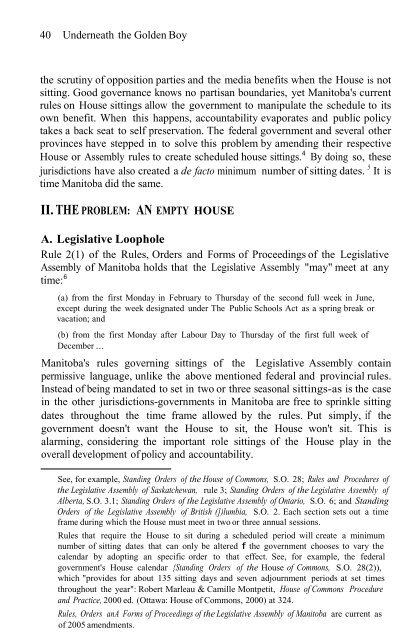UTGB Vol 5.pdf - Robson Hall Faculty of Law
UTGB Vol 5.pdf - Robson Hall Faculty of Law
UTGB Vol 5.pdf - Robson Hall Faculty of Law
Create successful ePaper yourself
Turn your PDF publications into a flip-book with our unique Google optimized e-Paper software.
40 Underneath the Golden Boy<br />
the scrutiny <strong>of</strong> opposition parties and the media benefits when the House is not<br />
sitting. Good governance knows no partisan boundaries, yet Manitoba's current<br />
rules on House sittings allow the government to manipulate the schedule to its<br />
own benefit. When this happens, accountability evaporates and public policy<br />
takes a back seat to self preservation. The federal government and several other<br />
provinces have stepped in to solve this problem by amending their respective<br />
House or Assembly rules to create scheduled house sittings. 4 By doing so, these<br />
jurisdictions have also created a de facto minimum number <strong>of</strong> sitting dates. 5 It is<br />
time Manitoba did the same.<br />
II. THE PROBLEM: AN EMPTY HOUSE<br />
A. Legislative Loophole<br />
Rule 2(1) <strong>of</strong> the Rules, Orders and Forms <strong>of</strong> Proceedings <strong>of</strong> the Legislative<br />
Assembly <strong>of</strong> Manitoba holds that the Legislative Assembly "may" meet at any<br />
time: 6<br />
(a) from the first Monday in February to Thursday <strong>of</strong> the second full week in June,<br />
except during the week designated under The Public Schools Act as a spring break or<br />
vacation; and<br />
(b) from the first Monday after Labour Day to Thursday <strong>of</strong> the first full week <strong>of</strong><br />
December ...<br />
Manitoba's rules governing sittings <strong>of</strong> the Legislative Assembly contain<br />
permissive language, unlike the above mentioned federal and provincial rules.<br />
Instead <strong>of</strong> being mandated to set in two or three seasonal sittings-as is the case<br />
in the other jurisdictions-governments in Manitoba are free to sprinkle sitting<br />
dates throughout the time frame allowed by the rules. Put simply, if the<br />
government doesn't want the House to sit, the House won't sit. This is<br />
alarming, considering the important role sittings <strong>of</strong> the House play in the<br />
overall development <strong>of</strong> policy and accountability.<br />
See, for example, Standing Orders <strong>of</strong> the House <strong>of</strong> Commons, S.O. 28; Rules and Procedures <strong>of</strong><br />
the Legislative Assembly <strong>of</strong> Saskatchewan, rule 3; Standing Orders <strong>of</strong> the Legislative Assembly <strong>of</strong><br />
Alberta, S.O. 3.1; Standing Orders <strong>of</strong> the Legislative Assembly <strong>of</strong> Ontario, S.O. 6; and Standing<br />
Orders <strong>of</strong> the Legislative Assembly <strong>of</strong> British (])lumbia, S.O. 2. Each section sets out a time<br />
frame during which the House must meet in two or three annual sessions.<br />
Rules that require the House to sit during a scheduled period will create a minimum<br />
number <strong>of</strong> sitting dates that can only be altered f the government chooses to vary the<br />
calendar by adopting an specific order to that effect. See, for example, the federal<br />
government's House calendar {Standing Orders <strong>of</strong> the House <strong>of</strong> Commons, S.O. 28(2)),<br />
which "provides for about 135 sitting days and seven adjournment periods at set times<br />
throughout the year": Robert Marleau & Camille Montpetit, House <strong>of</strong> Commons Procedure<br />
and Practice, 2000 ed. (Ottawa: House <strong>of</strong> Commons, 2000) at 324.<br />
Rules, Orders anA Forms <strong>of</strong> Proceedings <strong>of</strong> the Legislative Assembly <strong>of</strong> Manitoba are current as<br />
<strong>of</strong> 2005 amendments.














